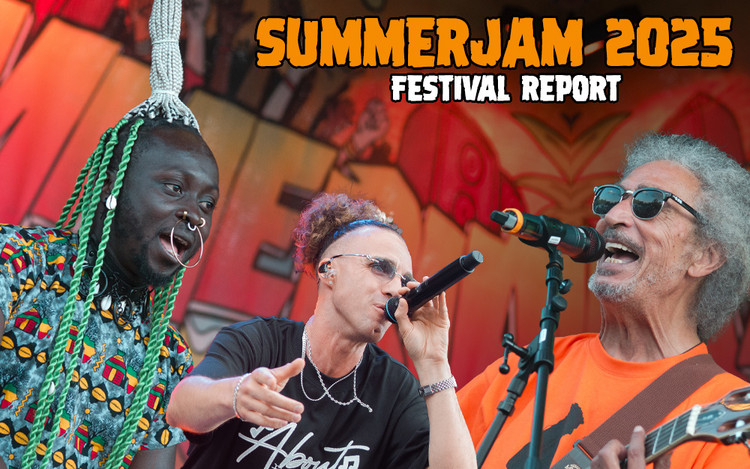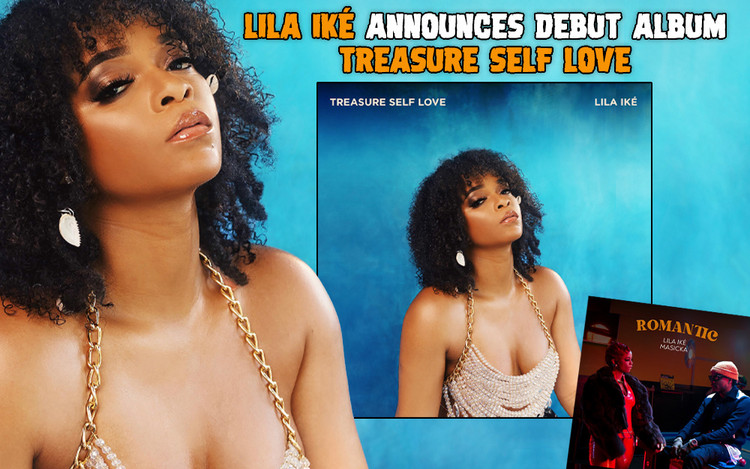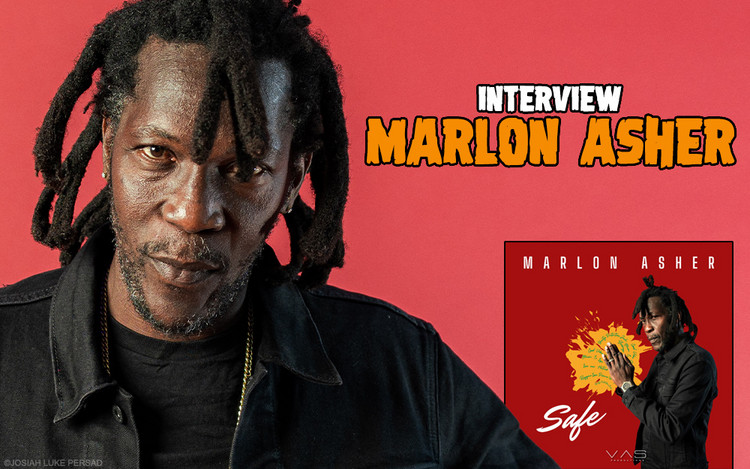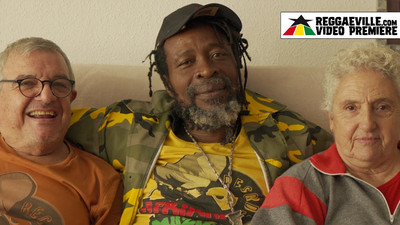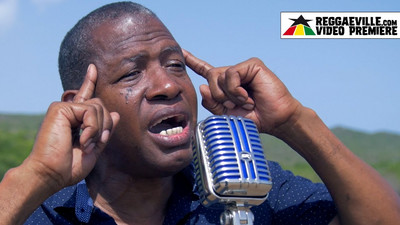Sebastian Sturm ADD
Interview: Sebastian Sturm
10/10/2011 by Valentin Zill
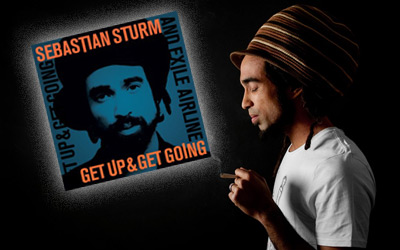
Sebastian Sturm is an outstanding part of the German reggae scene. Most offbeat artists in this part of Europe are geared to more recent developments in Jamaican music. Sebastian though brings back the golden days of roots reggae music. His voice sounds as if Bob Marley had personally taught him how to sing. His melancholic style builds a bridge from disease-of-affluence-plagued middle class Europeans to early Jamaican sufferer‘s reggae. Sturm has earned himself a solid fan base in the last years. With Get Up & Get Going, he is about to release his third album. It is about time to introduce him to an overseas audience! Seize this chance to get introduced to one of Europe‘s most remarkable artists.
Let us start from scratch. You started your musical career with punk rock. How come you switched from punk rock to reggae music?
That I get asked frequently. But I think that's not so far-fetched, because other bands have done so already in the 80s. Like The Clash. I've been listening to them sometimes, although I found their reggae stuff not that cool. NOFX had some cool songs, a few ska tunes. But that was not too much my thing at that time. Punk was already straight punk. Eventually I came across some Marley LPs, thanks to my brother. Marley really impressed me not with his Redemption Song or No Woman, No Cry, but rather with the old ska stuff that left me wondering whether that was really him. Simmer Down for example, that was the hit that got me into ska. There already were similarities - he sings punky, it is just a different rhythm. What really convinced me was Mellow Mood. An age-old version. I don‘t know if it was with Lee Perry. Beautiful vocals... After discovering this tune I started to write my own reggae songs with the acoustic guitar, grasp melodies and not only yell. The result was a pretty cool tune, and from there it developed further. The vocals for three voices were actually the decisive factor for my move to reggae. The first years I used to only work my way through Marley's LPs. There was nothing besides that for me. Only much later I discovered other artists. Plus I was more and more annoyed by the concerts in my last punk phase. They were always like this: three or four people beating up each other in front of the stage, the rest standing three meters away. And of course there were no girls (laughs). Only boys. In 1999 I had my first reggae / ska band. None of us knew exactly how it worked. We had to find out how the rhythm actually works by studying Marley. We went from ska to rocksteady to roots reggae then - the same way the music had taken originally. Only that I stuck with roots and dispensed with ragga and dancehall.
What was it about reggae that intrigued you the most, apart from the beautiful ladies in front of the stage?
The person Marley I find fascinating. I've read quite some things about him, about the whole background. Even the Jah Rastafari thing fascinated me, although I can't avow myself to it - that somehow doesn't work if you're not from Jamaica. Even though most tunes I listen to deal with Rastafari. Generally how the music is played of course - the discipline in the band. 13 people on stage, and it works... And you don't have to be a virtuoso to play reggae. You just need to know how it works. The most fascinating thing is how the music is constructed. That is in the foreground for me. That's why I rarely sing dub plates or use riddims from others.
What artists other than the Wailers had the biggest influence on your sound?
The Wailers are the crucial band, what one can probably hear on my recordings. I've always said that Marley has taught me to sing - before that I had no idea of how to do it. What leaves its mark on the new album: the new Clinton Fearon album, Mi Deh Yah. Very great! The Gladiators, especially when it comes to the backing vocals. Groundation have influenced my music a lot. Vocally, I have parallels with Harrison Stafford anyway, he also has a high, powerful voice. I just don't sound as jazzy. What we've learned from Groundation is to break out of reggae, without really leaving it. In the intro of It's Not Just, perhaps there one can hear the influences of Groundation. We also got inspired by Marley's Talking Blues album. They play everything much more funky, much more playfully, more teethed. The instruments all have their eligibility, not everything is just minimalistic.
You made your fans wait three years since your last album. Why did you take yourself so much time?
To my fans: I'm sorry for that! You have to forgive a sensible, complicated human being like me for that. But now it's been released. After the second record I thought that something had to happen. I was successful for five years and had a great time with the Jin Jin Band and Martin Pauen (the producer). I had noticed that if I wanted to reach new shores... How do you do that? Advancing further with the same band was difficult. Really the only remedy was to work together with new people. With new and old people, as half of the new band (Exile Airline) consists of Jin Jin members. You have to countenance more when people come from different musical genres. Do we allow them to have a say in the compositions? I think that worked. What is new is the acoustic guitar - there are more songs with acoustic guitar played by myself. I took a few steps towards a new direction, but not so much as that the roots reggae fan would be too snapped to listen to it (laughs). I also wanted to show with songs like Get Up & Get Going what it sounds like when I create a song at home. This is no music for the dance hall, this is music for home use or the beach. Many people love that.
Do you write your lyrics before you create the riddim?
It depends. Sometimes I just hum a melody and then write the lyrics to it. But usually the text is there first.
To fully orchestrate a tune, do you play the riddim to your band and jam with them?
I do it like this meanwhile. In the past I used to have everything in my head, being the little dictator who told everyone what they had to play exactly for this to work. Now I limit myself to having an idea for the bass line, the chords and vocal melodies. Then I let the band do. Actually, they can do that much better than me (laughs). That's the point: one must allow other influences in, as other musicians also have ideas. Only like that Sebastian Sturm and Exile Airline can advance.
Is that the wisdom of age that comes with growing experience?
Yes, I think so. To play for someone who has thought of everything already is no great fun. If I imagine I'd be a guitar player for someone else with my own major output but couldn't contribute at all, I'd tell myself come on, you can't do that for the rest of your life. The new thing now is Sebastian Sturm & Exile Airline. I see myself as a part of Exile Airline. We are a band and have tried to develop a style of our own that not everybody can reproduce. Exile Airline is no backing band. We want to stand out.
You love analog recording. How do I have to imagine your studio?
Martin Pauen, with whom I had worked previously, had really brought the old analog stuff. But the new album was recorded in Rootdown's studio, where not everything was analog. We used computers to record, cut and edit. We channeled that through analog stuff like a tape machine. We didn't use software instruments. The instruments are real. There are a couple of synthesizer elements on the new album, but very subtle, rather as dub effects. There is nothing more beautiful than the sound of a real Hammond organ.
The last tune on Get Up & Get Going is a combination with Kiddus I.
Several stories connect us. It started with our French connection, Musicaction, which organizes our gigs in France - the chief of them, Fred Lachaize, organizes the Reggae Sun Ska Festival. When we first played there, he asked me with whom I could imagine to play next year. Since we are all total Rockers fans, we've wondered what Kiddus I does these days. You hear nothing from him. Is he still alive? Chance brought it about that one guy knew Kiddus personally. Then we did this Reggae Sun Ska project with Jahcoustix, Kiddus I and myself. One half of the band consisted of members of Jin Jin, the other one of members of Dubious Neighbourhood, Jahcoustix' band. Everybody played four, five songs. We had a week to rehearse. They gave us a hall, and we lived together in one house. So we got closer and made friends. That was a great time. Kiddus is now 74 years old or so, an old man, but he didn't miss a single party! He is an incredibly pleasant contemporary and a great storyteller. Then we went on stage to play for 10,000 people - it was great. Somehow Kiddus I returned from oblivion, and has been booked again in France, with Inna Di Yard and stuff. I can recall a concert in Rouen. We played his tune Graduation In Zion there, and suddenly he came on stage. I had no clue. Since then I knew, all right, he also likes me (laughs). He finished his song. So a personal relationship developed. He then spent three days with us in the studio, totally straightforward. I knew that this was the only feature I really wished for. Clearly there would have been more famous artists to record a combination with, but the personal vibes have to be irie.
I have the impression that your new album sounds even more melancholic than your first two.
The melancholy in reggae has always fascinated me. I can't write sunshine reggae. I find it interesting to use strong, sad themes in reggae. The fact that reggae is positive music through and through - the beat is simply uplifting - this mix... You could never write a desperately unhappy, depressive reggae song, where you would point a gun to your head while listening to it. That is just not possible. That you can't become too sad and crash makes it exciting for me. The record is melancholic, but also hope-giving. Although Never Been As Sad is the saddest story that could happen to one, there is still this: The world is crazy / that 's all I know / sometimes it makes me feel alright / sometimes it makes me feel blue. I like to play with that, that just suits me well. My life is also an up and down .
Is Never Been As Sad fueled by personal experiences of yours?
It's not autobiographical. It happened to a mate of mine. If he finds out that I write about him... (laughs). It is not autobiographical, fortunately. But his story really distressed me. If I'd project that on my life, it would probably be the saddest day of it.
Get Up & Get Going is your first album on Rootdown. How was your collaboration initiated?
Rootdown had already taken care of distribution for us earlier. They are friends of mine. When they heard of my decision to work with Philip Breidenbach as a producer, they helped us financially during the most difficult phase - of their own accord. They asked me: Can you imagine to work with us? I feel really comfortable when working with them. They are cool people. Without Rootdown, the crowd would have had to wait for another two or three years for my third album.
With your style, you actually don't really fit into their catalog.
That's right, that's right. But that doesn't really matter. I must get along with the people. The Rootdown idea is one family, and they live that. It's a pleasure to work with them. They are very committed.
Cue tour: You promote your new album with a tour that begins on 10/23/2011. I was stunned to see that you start with La Cigalle in Paris, with two acoustic shows on two consecutive nights. That is unusal for a German artist.
That is as a support for Groundation, which wasn't indicated on my website (laughs). But a great start that is. And I am looking forward to meeting the guys from Groundation again. On their French tour, we will support quite some of their concerts.
In France, you play for larger audiences than in Germany?
Yes. That was great in the past. In 2008, we were touring French clubs for the first time. In 2009 and 2010, we partially played the same clubs. 200 people had become 300. That was really cool. Whereas in Germany I have the feeling that I have to start from scratch over and over again. A few faces are always familiar to me, so there already is a German fan base. But it's not as big as I want it to be. In France, the growth is steadier.
Roots in France has much more weight than in Germany.
Yes. The roots artists are headlining festivals there. The French celebrate the entire spectrum of reggae as pop is celebrated in Germany. There are a lot more people there who are interested in reggae. I don't even feel like they understand the lyrics better than the Germans, but the message is there. Perhaps that has to do with the many African immigrants living there. The roots veterans are hardly ever coming to Germany, but regularly tour France big. Because I do roots reggae, I find it easier there to find my audience.
Do you intend to push your publicity outside of Europe?
This is my next dream actually, it's about time. As I sing in English, I guess that people all over the world could like Sebastian Sturm.
The new album GET UP & GET GOING [PRE-ORDER HERE]
will be released October 14th 2011!




